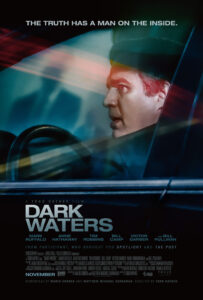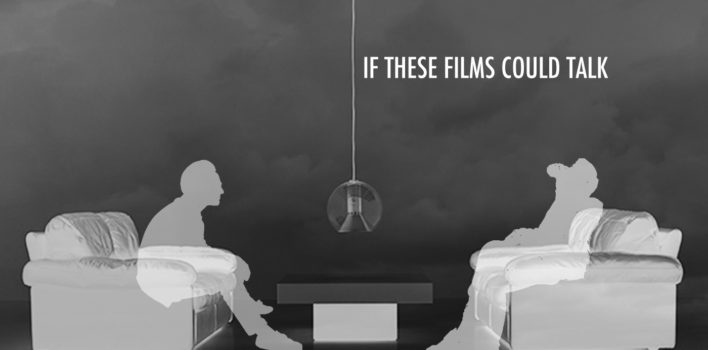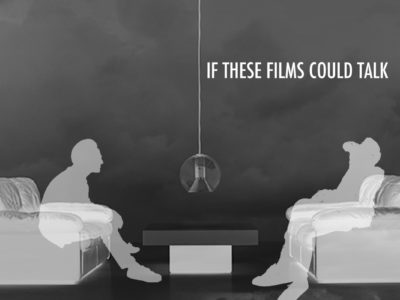A Deluge of Dark Water(s): The Dark Waters of Dark Waters (1944), Dark Waters (1993), Dark Water (2002), and Dark Waters (2019)
 When I was a child, I thought I was surrounded by bad guys. This is not a metaphor.
When I was a child, I thought I was surrounded by bad guys. This is not a metaphor.
I had the creeping suspicion that everyone I knew—my grandma, the dentist, the children’s pastor at my church, my pre-school teachers, everybody—was a villain. They were members of some vast conspiracy to be villainous and do villainous things, although I never quite knew what. Every time I wasn’t looking, they were conferring with each other, plotting their next bit of villainy, hashing out the nuts and bolts of how to be evil and do evil under the cover of darkness, just outside my eyeline, where I was powerless to stop them.
I, of course, was some kind of chosen vehicle of the Forces of Good. I knew not why I was chosen, or for what, precisely, but I was the Three-Foot-Tall Protagonist, slipping in and out of the grip of evil, biding my time until I could overthrow them once and for all. I, of course, had no plan for how to accomplish this.
The dentist was bad. I needed to stop the dentist before he did some bad something-or-other, but that was not going to stop me from getting my teeth cleaned every time my mom brought me to his office. What if I had caught him doing evil in an alleyway? I don’t know. I didn’t know much about alleyways. Would I fight him? I don’t know. I couldn’t punch very hard and I didn’t have a Batman utility belt with all kinds of gadgets to give me the upper hand.
Same thing went for Grandma. I had to stop her. But how? When I was visiting the farm, she had the home-field advantage and a whole host of weaponry in her arsenal—it was Oklahoma, after all. Once, the Schwan’s man showed up to sell her some waffles and chicken drumsticks and I got it in my head that he was a good guy like me, a kindred spirit. I thought, “If I can just get him alone, I could recruit him, and we could bring this whole operation to the ground.” I snuck out the back door, found all the sharpest rocks I could, and placed them strategically under the tires of his truck. “When he tries to drive away,” I thought, “They’ll puncture the tires and he’ll be stranded, and he’ll be forced to be my sidekick. We are going to save the world.”
We did not save the world, because his tires did not puncture, and because my grandma was not a villain, because none of these people were. I was not tiny Batman, and these were all simply childhood delusions, fairly standard ones at that.
Even if the form it takes is frequently misdirected and fantastical, children are onto something. They instinctively know, seemingly before they can speak, that things and people are rarely what they seem, that sinister designs hide behind every surface, every coat of paint, every pair of kind eyes that greets them.
 That is to say that as a four-year-old I could probably have guessed the big reveal in Dark Waters, the 1944 film directed by Andre de Toth—the guy who directed the Vincent Price House of Wax, and a handful of other classics. Dark Waters (1944) does not have Vincent Price and it definitely is not a classic, but it is technically a movie and I did watch it.
That is to say that as a four-year-old I could probably have guessed the big reveal in Dark Waters, the 1944 film directed by Andre de Toth—the guy who directed the Vincent Price House of Wax, and a handful of other classics. Dark Waters (1944) does not have Vincent Price and it definitely is not a classic, but it is technically a movie and I did watch it.
In the film, a young woman named Leslie Calvin is involved in a shipwreck. She wakes up in a hospital in Louisiana. Her doctors tell her she needs to rest for a few weeks, preferably with someone to take care of her. The problem, though, is that she has no living family members except for an aunt and uncle whom she has never met. The doctor insists, so she writes to them requesting to visit for a while. They write back, eagerly awaiting her arrival. But when that arrival comes, her relatives are taken entirely by surprise.
See where this is going?
No one seems to have been aware that she was coming. Still less do they seem capable of maintaining a conversation of any detail about the family members that they share. Leslie speaks with her aunt about her mother and all her aunt can muster is, “Your mother was the pretty one.”
Leslie shrugs it off—because what else is she going to do?—but things begin to escalate.
During the night, she hears voices. Ghostly wailing, calling her name. A former employee of her uncle’s plantation approaches her on the bayou one day, begging her to get his job back. When she asks him to elaborate, he explains that not long before she arrived, the new manager at the plantation let him go without allowing him to appeal to her aunt and uncle.
See where this is going?
Eventually, the big reveal comes, although it’s not very big and it isn’t much of a reveal. The people who greeted her are not her relatives. Her relatives are dead. Because they were killed. In a scheme. To make money. Or something.
The explanation is fuzzy, but it doesn’t really matter. The bottom line is simple: Her loved ones were not who she thought they were.
***
 In this sense, Dark Waters (1944) bears a striking resemblance to another film, Dark Waters (1993). This 1993 film is the better motion picture. And it should be, because it’s the product of director Mariano Baino, who was famously awarded with a green card by the US government for directing movies so bloody well.
In this sense, Dark Waters (1944) bears a striking resemblance to another film, Dark Waters (1993). This 1993 film is the better motion picture. And it should be, because it’s the product of director Mariano Baino, who was famously awarded with a green card by the US government for directing movies so bloody well.
(Little known fact: This actually remains the basis of US immigration policy. If you’ve ever wondered why our border restrictions are so tight, it’s because we’re looking for the next Mariano Baino. So, I guess, take note. If you are seeking asylum in the United States, but Stephen Miller keeps stonewalling you, direct a really good movie and his hands will be tied. It worked for Mariano Baino.)
Dark Waters (1993) is about a young woman named Elizabeth, who—not unlike Leslie Calvin from Dark Waters (1944), has no living family members. Her mother died in childbirth. Her father was distant from the beginning and has only grown more distant as he’s grown more dead. Still, he has left her an obscene sum of money with the only stipulation being that she maintain a regular endowment to a particularly mysterious religious sect on a small island off some European coast. Naturally, Elizabeth wants to size up this idiosyncratic religious sect her father spent his life bankrolling, so she pays them a visit and discovers, naturally, that her father’s beneficiaries were a cult of Lovecraftian nuns who worship a fish god who demands human sacrifice.
Mariano Baino had a heck of a time trying to complete the film, since production was interrupted by multiple military coups (in multiple filming locations!). The result is that the film has a certain angular charm. The whole thing is hazy, like a dream, but belligerently so. Roughly half the film has the sound of a crying infant blaring over the dialogue, coming from no particular source, simply bleeding into the action on-screen. It’s unsettling. It’s also kind of stupid, but it absolutely works. I can still hear the baby crying and it’s been a month and a half. The baby is still crying. It never stops crying. Please send me the sweet release of death.
Maybe the reason it’s stuck with me for so long has less to do with the phantasmagorical soundtrack than it does with the fact that it obliquely taps into that primal fear that everybody, everywhere, all the time, is secretly part of some ghastly plot to do evil behind your back whether it’s your unseen relatives from Louisiana or your estranged father who gave all his money to an Aquatic Death Cult or your Oklahoman grandma or the dentist. We see the world through a glass dimly, as St. Paul says—or, to use a more relevant metaphor, through murky waters. We do not know other people because we cannot really see them.
***
 Both Elizabeth and Leslie are relatable, even as their situations dwarf the low simmer of paranoia that pervades the more mundane experiences of the rest of us. Even if you can’t fully identify with the disillusionment that occurs when you run a blacklight over your family members and discover that they’re covered in the sort of muck and stain that would have sent you running for the hills if you had known beforehand, perhaps you can sympathize when you broaden the phenomenon of disillusionment past the boundaries of the nuclear(-or-extended) family.
Both Elizabeth and Leslie are relatable, even as their situations dwarf the low simmer of paranoia that pervades the more mundane experiences of the rest of us. Even if you can’t fully identify with the disillusionment that occurs when you run a blacklight over your family members and discover that they’re covered in the sort of muck and stain that would have sent you running for the hills if you had known beforehand, perhaps you can sympathize when you broaden the phenomenon of disillusionment past the boundaries of the nuclear(-or-extended) family.
Maybe your parents loved you and your family embraced you and nobody sacrificed you to an oversexed Fish God, but you’ve been sold down the dark waters of the Louisiana River whether you realize it or not, because you probably have cooking products in your home.
You’re probably dependent to some degree on DuPont, Inc. Maybe you’ve got a non-stick pan, or something else along those lines, because they’re so convenient, because they cut your dishwashing time in half, because “the march of progress” has brought us to a point where domesticity is peripheral, for both men and women, where the drudgery of housework has nearly evaporated into the mist. And yet, that very convenience is a rug that’s been pulled out from underneath us all.
Because the great time-and-labor-saving conveniences we’ve gradually embraced in the years since the Second World War are killing us. Literally. When they aren’t killing us, they’re mutilating us, little by little. That’s what Robert Bilott, the central protagonist in Dark Waters (2019) discovers.
Bilott is a real person, unlike the protagonists in the other films. He was a corporate lawyer for companies like DuPont, defending them from generally well-founded lawsuits from the common folks whose lives their exploitative practices had destroyed. But, to make a long story very short, the longer Bilott worked for DuPont, the clearer it became just how deeply that exploitation ran.
 DuPont didn’t simply exploit their employees—knowingly exposing them to dangerous chemicals on the work-line which deformed their bodies and poisoned their blood and halved their life spans—they also exploited their customers, and by extension the general public.
DuPont didn’t simply exploit their employees—knowingly exposing them to dangerous chemicals on the work-line which deformed their bodies and poisoned their blood and halved their life spans—they also exploited their customers, and by extension the general public.
I don’t understand all the science-y stuff behind it, but, evidently, the chemical processes that go into safeguarding cookware can very easily cause mutations in the human body when heated to certain temperatures. That means that when we cook on them, they are releasing chemicals into our homes that harm us, sometimes seriously. This is, to my understanding, one of the reasons for the uptick in cancer cases over the last half-century, not to mention a whole slew of other major medical conditions.
Bilott discovered this, specifically, while playing for DuPont’s team. This was the straw that broke the camel’s back, so he switched sides at great personal cost to himself and his family with minimal reward. That is to say, after spending half of his lifetime up to this point fighting DuPont to achieve justice for their victims, he managed to get a class-action payout equal to roughly, what? About year’s profits from DuPont?
He didn’t even break their stride. DuPont is still active. They’ve faced practically no consequences. They are continuing their operations. Practically no reparations have been made to their victims. Most of the folks who have suffered at their hands are still suffering, no less than before, and haven’t seen a cent in restitution.
“How long, O Lord?” as the Psalmist says.
In other words, you and I and everybody you know are very much the Elizabeths to DuPont’s Absentee Father, the Leslie Calvin to DuPont’s Aunt and Uncle. The great cultural institutions in whose streams we swim and move and have our being are not the dedicated servants of the common good that we have been told. Our arrangement is not mutually beneficial. We are the human sacrifices made to their Lovecraftian fish god and our blood is their profit.
***
 Now, imagine all of these things, but, like, beyond the grave, and you’ve got Dark Water (2002), the now-canonical Hideo Nakata film about a divorcee whose daughter makes friends with a vindictive ghost girl.
Now, imagine all of these things, but, like, beyond the grave, and you’ve got Dark Water (2002), the now-canonical Hideo Nakata film about a divorcee whose daughter makes friends with a vindictive ghost girl.
I re-watched this one for the first time in years recently and found it especially fascinating. As quality goes, it may be Nakata’s best. That is to say, it never quite hits the heights of Ringu (1998), and at no point does it produce an image as viscerally lonely as the empty kitchen scene at the halfway point of The Complex (2015), but Dark Water represents, perhaps, Nakata’s sturdiest effort. It’s not as wobbly as Ringu 2 (1999)—although it’s also not as good as that film either—nor is it as blisteringly terrifying as the original Don’t Look Up (1996), but it’s also got none of the bullheaded missteps of The Ring Two (2005) or the oafishness of Chat Room (2014). Dark Water is Hideo Nakata on a good day, after buying an Adderall for $20 from my friend Zach in the student center at the local community college. It’s a steady piece of filmmaking.
That stability serves to counterbalance the extreme lack thereof from nearly every major character. It’s a film about parental neglect, among other things, and the way such neglect tends to haunt the children it inflicts itself upon. The spectral child, Mitsuko, did not ask to become a vengeful ghost, it was thrust upon her—not actively, not belligerently, but through sheer force of negligence. Her parents were not home when they should have been, and she drowned. Mitsuko is a victim of the violence of absence. Her parents were not what she needed them to be. Her pre-school teachers were not what she needed them to be. Her community was not what she needed it to be. And it killed her.
Familial neglect, like familial dysfunction, is not harmless. It brutalizes. It mutilates. It coarsely disrupts and reshapes our psyches until our emotions don’t work right and everything’s a windmill to swing at or run from. Mitsuko is everybody. We are all confused, neglected, brutalized, scared, angry, vindictive, swinging at each other because that’s what we know how to do, because no one and nothing is what we think they are, and we aren’t what we think we are, and all the structures and institutions that were meant to provide stability and meaning and clarity and peace and rest and direction were exactly that way, too—like us, but bigger, and broader. That same dysfunction we inherited is operating in them at full capacity, catechizing their victims into new dysfunctions as we speak. The fish gods are everywhere.
The fish gods are everywhere.
The fish gods are everywhere.
***

Still, though: Our worst paranoid fantasies can only ever be half-true.
The summer after graduating high school, I babysat the child of a family friend. He reminded me of me at that age: There were villains under every rock—the lifeguard at the neighborhood pool, the girl at the ticket booth when I would take him to the movie theater, the elementary school teacher that his mom left his dad for.
However, his childhood fantasies were more sophisticated than mine had been, because there were also secret agent types everywhere; invisible Good Guys: the dog that we would meet each morning as we crossed paths with the neighbors during a walk around the block, the two-by-three picture of White Jesus hung up on the wall in the living room of his dad’s house, the janitor who always seemed to be on shift at the McDonald’s around the corner from the movie theater, and me.
One morning, he insisted in all earnestness that he had received a call from the nameless Good Guy organization—of which we were all secret members—leaving him detailed instructions on how to make a Powerpuff Girl from scratch. This mission was of the utmost importance. I suggested that we might have a difficult time getting hold of sugar, spice, and everything nice at this particular hour of the day, but he was undeterred.
“That’s the fake recipe,” he said. “The one they put on TV. They can’t tell you the real recipe, because then the Bad Guyswould know it.”
I couldn’t argue with his logic there. So, we spent the day running around the neighborhood, finding the conveniently attainable items on the list he conjured up: pinecones, grass clippings, a pool float, and a dog’s collar which we had a heck of a time talking the neighbor into lending to us.

At the end of the day, we put them all together and I halfway expected a Powerpuff Girl to materialize.
A Powerpuff Girl did not materialize, of course, and, trying to comfort him, I said, “Maybe it’ll work next time.”
“It did work,” he assured me. “You just couldn’t see it ’cause you didn’t know what you were looking for.”
Ryan Ellington is a gorilla who escaped from the zoo and currently resides in North Carolina, where he’s a student at a seminary school. He writes at Grindhouse Theology. If you see him on the street, please do not approach him.






